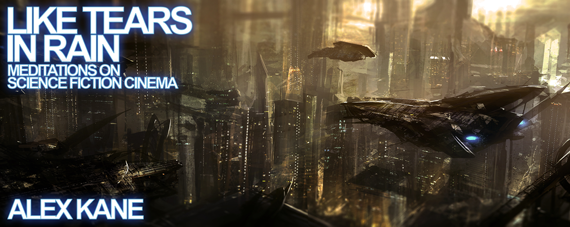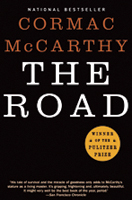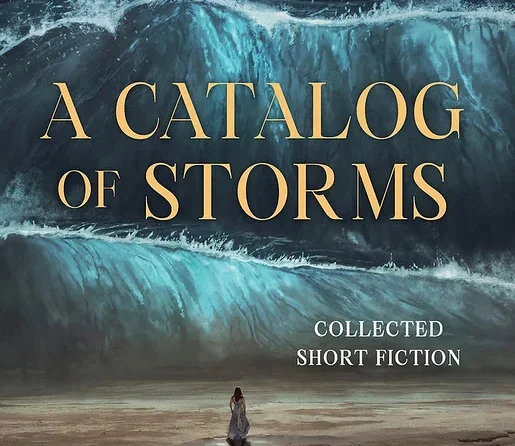
The following essay originally appeared in issue number 111 of the quarterly journal Foundation: The International Review of Science Fiction, edited by Graham Sleight. Revised and expanded, 2nd ed.
Cormac McCarthy’s post-apocalyptic novel The Road exemplifies both the acknowledgment of essential human goodness and the flaws inherent in the Emersonian individualism that has grown to define the American identity. In doing so, it achieves a successful, resonant portrayal of human life enduring—albeit not without hardship and great loss—in the face of a hypothetical global catastrophe that has irreversibly altered the state of our planet’s ecology. Nevertheless, McCarthy presents a somewhat false vision of human nature. Despite the merits of American individualism and the truth with which it endows McCarthy’s characters, the Christian moral framework presented in the novel fails to confront properly the rise of American pragmatist ideals in what appears to be the author’s effort to define an antagonist in society’s remnants that may not, in fact, exist at all. Because of his assertions that anyone else is dangerous, and that giving aid to others will only bring the principle characters harm, the father in the novel represents, at least in part, the failure of amoral thought to rebuild humankind through communal endeavor.
What caused the end of the civilization goes unexplained, although various contrasting evidence is presented that might be used to support both biblical and scientific explanation, which need not be exclusive. The beginning describes “Nights dark beyond darkness and the days more gray each one than what had gone before. Like the onset of some cold glaucoma dimming away the world” (3). The grayness, the cold, and the motif of blindness recur throughout the work; the sun has been permanently obscured by whatever cataclysm, whether cosmic or geological, has blackened the earth with ash.

Regardless of the cause, in which humanity itself may have played a role, the world McCarthy envisions is one of a dismal future, in which technology no longer seems to benefit the scattered human beings who still survive. Instead, basic expedience and the allocation of resources necessary for survival drive the plot. Science fiction is a genre of hypothetical future scenarios, in which characters work to problem-solve, making use of whichever scientific fields or concepts are most appropriate, and find some sort of salvation from the ills of the imagined future. In The Road, we discover an Earth no longer hospitable to life, a world which has never existed previously but which is all too plausible, and a microcosmic struggle between the voices of morality and amorality; between pragmatism and individualism; between rationality and faith. Certainly this qualifies the novel as a work of science fiction, despite its reputation as one of mainstream literature, and the genres of speculative fiction have every reason to lay claim to what is arguably the most important novel of the previous decade.
The narrator, whose concern is mostly with the viewpoint of the father—ostensibly the protagonist—describes “[t]he cold and the silence. The ashes of the late world carried on the bleak and temporal winds to and fro in the void” (11). Later, at the sight of a distant forest fire’s glow, the father observes that “[e]verything was alight. As if the lost sun were returning at last” (31), and notes that “[t]he color of it moved something in him long forgotten” (31). Clearly, then, the sun has become little more than a memory for the father and his son; what little light and warmth has kept them alive has come filtered through a veil of gray or from the constant kindling of campfires.
In the novel’s beginning, the narrative supposes that any hope for the survival of the father and his son must come from each other, explaining that “they set out along the blacktop in the gunmetal light, shuffling through the ash, each the other’s world entire” (6). The titular road, then, serves as a symbol not only of the father and son’s progress but also that of humanity as a whole—particularly the ultimate question of whether our species is to survive a flood of breath-stifling ash, be it by Darwinian or moral means. It is the man and his son’s path toward what they hope will be their eventual salvation, and also, reasonably, the trials they’ll face along the way. These very trials are where the moral heart of the novel is illuminated.
The biblical atmosphere McCarthy weaves with his vision of a desolate, post-apocalyptic America lends itself to the question of God’s role in humankind’s collective suffering. From the outset, the reader is offered the image of a world “[b]arren, silent, godless” (4)—with “[d]ust and ash everywhere” (7). Upon the reader’s initial introduction to the viewpoint character’s sleeping son, the protagonist reflects, “If he is not the word of God God never spoke” (5). This effectively establishes the son’s most constant and vital role in the novel, which is that of moral authority. Yet later, when the boy is again sleeping, the man is shown to be ill, “crouched coughing . . . for a long time” (11), and even cursing God: “Are you there? he whispered. Will I see you at last? Have you a neck by which to throttle you? Have you a heart? Damn you eternally, have you a soul?” (11–12).
The father’s anger at his condition—what he fears might prove a fatal illness—and his fear toward the fate of his son is akin to that of many victims of suffering throughout the Bible—especially Job. That he should place the blame on God in the first place is an especially Jobian presumption; no doubt McCarthy was at least partially conscious of this as he drafted the novel.
This is an old fallacy that permeates the minds of many religious Americans, and one that society at large would do well to expunge if pragmatism is ever to successfully hold sway over any facet of our society. Contemporary American intellectual Cornel West in his essay “The Crisis in Contemporary American Religion,” examines the pitfalls of modern religious culture in America. He notes that:
American religious life . . . lacks a substantive social consciousness. This is so because, like so much of American life, it suffers from social amnesia. American religious people have little memory of or sense for collective struggle and communal combat. At the level of family and individuals, this memory and sense lingers. But at the level of larger social groups and institutions, this memory and sense of struggle evaporates. This social amnesia prevents systemic social analysis of power, wealth and influence in society from taking hold among most religious Americans. Instead, the tendency is to fall back on personalistic and individualistic explanations for poverty . . . and social catastrophe. (358)
This seems to pinpoint precisely the basic flaw in the father’s anger toward God in the wake of a global catastrophe. Society refuses to acknowledge any fault of its own; simplicity and institutionalized justice come more readily in the form of blaming a single individual for more complex atrocities, in which we are perhaps a great deal more complicit than we would care to admit. In light of this, West advocates “a profound sense of the tragic character of life and history that generates a strenuous mood, a call for heroic, courageous moral action always against the odds; and a biblically motivated focus on and concern for the wretched of the earth that keeps track of the historic and social causes for much . . . of their misery” (359).

This is where the father in The Road commits several grave moral follies and is consequently distanced from his son, who then questions the righteousness of his father. The first such incident involves their discovery of a lightning strike victim. The narrative describes the wandering man as being “as burntlooking as the country, his clothing scorched and black. One of his eyes was burnt shut and his hair was but a nitty wig of ash upon his blackened skull” (McCarthy 49–50). At the sight of him, the boy asks, “Cant we help him? Papa?” (50), and the father replies, “No. We cant help him. There’s nothing to be done for him” (50). Shortly thereafter, the father elaborates further: “He’s going to die. We can’t share what we have or we’ll die too” (52). West would undoubtedly take issue with this almost reflexive decision to ignore the injured man for the sake of their own survival. There’s nothing Christian and certainly nothing heroically Christian in merely dismissing the man’s life as a lost cause. Whether the man is ultimately doomed or not, the sort of individualistic selfishness that allows the father, so concerned with his assertion that he is good—because together he and his son are “carrying the fire” (83), to leave the man to die without any attempt to help him is not only un-Christianlike, but also a denial of civilized society’s role in bettering the lives of individuals.
Slightly earlier in the novel, the boy observes “the dead roadside trees” (35), just as another starts to fall in the distance. The father comforts him with the notion that “It’s okay. . . . All the trees in the world are going to fall sooner or later. But not on us” (35). Why the arrogance and self-righteousness? The novel seems to convey that this is simply because, as the father later argues, “We’re still the good guys. . . . We always will be” (77).
The innocent, though, are of little to no concern to the father. Farther along on their journey down the road, long after the encounter with the man who had been struck by lightning, the boy glimpses “something move at the rear of the house across the road. A face . . . looking at him. A boy, about his age” (84). Without pause, the boy runs toward the house, and calls out, “Come back . . . I wont hurt you” (84), but his father seizes and scolds him (84–5). To illustrate his point that outsiders can present nothing more than danger, the father asks, “Do you want to die? Is that what you want?” (85). Later, after he has had time to reflect—perhaps in anger—on the sight of the other boy, the son declares, “I’m afraid for that little boy. . . . We should go get him, Papa. We could get him and take him with us. . . . And I’d give that little boy half of my food” (86). To this, the father repeats his typical refrain: “We cant” (86). The scene ends, however, with the son getting in the final word: “What about the little boy?” (86).
Our American tendency toward this kind of disregard for those outside one’s own family—indeed, for all of society—is a fault in our collective psyche that can be traced back to the radical individualism put forth by Ralph Waldo Emerson in his profound but decidedly damaging essay, “Self-Reliance.” Emerson argues that “[v]irtues are . . . rather the exception than the rule. . . . Men do what is called a good action, as some piece of courage or charity, much as they would pay a fine in expiation of daily non-appearance on parade” (Emerson 180). He goes on to elaborate that “the great man is he who in the midst of the crowd keeps with perfect sweetness the independence of solitude” (181). History has shown the ills of this mentality, especially when coupled with the absurdities of outdated-yet-lingering Puritan belief; it is a move toward reclusiveness at best, and the definition of sociopathic thought when taken to the opposite extreme.
A thinker like West could never condone this sort of utter disregard for a fellow human being, where individuals hold little more than a superficial regard for the commonwealth of society; it goes against our popular modern conception of goodness and undermines even something as sacred to this nation as patriotism—and yet this mentality endures. The notion of nonconformity is counted among the most prevalent of American ideals and as a result is often exemplified throughout our culture to varying radical degrees.
When at last the boy and his father encounter a true external threat, some means by which the father’s fears about outsiders following the collapse of civilization might come true, the father again commits a savage moral indecency—only this time the boy voices no objections, out of what seems to be simple fear. In an apparently vacant house, they find a padlocked hatch in the floor of the pantry, and the father speculates that they might find food beneath it. After prying it open with a spade, they descend to find “[c]oldness and damp. An ungodly stench. . . . An old mattress darkly stained. . . . [N]aked people, male and female, all trying to hide . . . a man with his legs gone to the hip and the stumps of them blackened and burnt” (McCarthy 110). The food cache the father had hoped to find turns out to be just that: a food store collected by human cannibals.
In an individualistic, and perhaps Darwinistic, move, they flee—up the stairs, ignoring the cries of the captives for help, and outside into the yard, where they are spotted by “four bearded men and two women” (111). Once they have reached a safe distance (something McCarthy would not have been able to grant them, had they chosen a pragmatist’s course of action beneath the pantry stairs), the father presses their sole means of protection into the boy’s hand: a revolver with one round in the chamber. “If they find you you are going to have to do it” (113), the father explains, then repeats the basics of an implied prior instruction: “You put it in your mouth and point it up. . . . [Q]uick and hard. . . . Stop crying. Do you understand?” (113).
[youtube https://www.youtube.com/watch?v=XXUCFk8VJFY]
Out in the context of society, an institutional world to be feared in Emerson’s morally desolate America, suicide becomes a suddenly valid course of action. However, in an earlier flashback scene, the father recalls the death of his wife, the boy’s mother, prior to the events of the novel. His wife finds no hope, no point in living in a dying world. “They will rape me” (56), she says. “They’ll rape him. They are going to rape us and kill us and eat us and you wont face it. You’d rather wait for it to happen” (56). One might consider the possibility of postpartum depression as a contributing factor for her ultimate choice, but there is also a component of atheism in her argument. She explains that “my only hope is for eternal nothingness and I hope it with all my heart” (57). There is a seemingly offhand remark made on the part of the father that suggests his wife may have gone blind, at least metaphorically if not literally, following the birth of their son. “Where are you going to go?” (58) he asks, and then: “You cant even see” (58).
This seems a telling point, given the scarcity of McCarthy’s mention of the mother, and moreover, that the boy and his father later cross paths with “[a]n old man, small and bent” (161), who turns out to be mostly blind. The boy manages to negotiate a single fireside meal for the man, despite his father’s reluctance (164–5). Later, in a lengthy dialogue, the old man claims, “There is no God. . . . There is no God and we are his prophets” (170). That the wife found no hope save for the nothingness she wished of death, and that the novel began with an image of “some cold glaucoma dimming away the world” (3), seems no coincidence.
If blindness is a motif symbolic of atheism, of which the mother’s death and the blind, unbelieving old man seem thoroughly illustrative, then an overly simplistic Christian conception of morality begins to take shape near the novel’s end. If the world is cast in varying shades of darkness and gray, clad in “soft ash blowing in loose swirls over the blacktop” (4), then the father’s refrain to the son that together they’re “carrying the fire” (83) asserts a duality as timeless and dated as the concept of good and evil: There are those who carry and follow the light of God, and there are those who have gone blind; a fortunate few may hold the hope of salvation, while others are rightfully doomed to a fate of “eternal nothingness” (57).
A third category, if one chooses to accept it as such, might include the few surviving human beings beyond the boy and his father: those who have resorted to the savage practice of cannibalism by force. This category is rendered devilish and inhuman for its somewhat Faustian manipulation of God’s natural order; they hold no moral status as their nature is never once questioned—they are simply evil.
The American pragmatist Richard Rorty would have likely taken issue with this portrayal of atheism as inherently hopeless—that atheists themselves are immoral, like the suicidal mother. Similarly, the assumption that those who believe in God are inherently moral and upright would not hold up against his atheist pragmatism. In his essay “Religion as Conversation-Stopper,” Rorty argues that “When it comes to morals . . . , every textbook, Scripture, and teacher is offset by a competing textbook, Scripture, or teacher” (Rorty 173), criticizing the assumption that “believers’ moral convictions are somehow more deeply interwoven with their self-identity than those of atheists with theirs” (174). Indeed, Rorty would no doubt have criticized the widespread popularity of The Road for exactly this reason. Its conception of morality does not accurately describe the human experience; one simply cannot assume that religious life is equated with moral life.
In the boy’s last conversations with his father before the man’s death, the boy asks, “Is it real? The fire?” (McCarthy 279), confronting his doubts about the inherent goodness that has so far been exclusive only to him and his father. “Yes it is” (278), the father says. “It’s inside you. It was always there. I can see it” (279). The final dialogue between them is in regard to the little boy they saw in the window near the beginning of the novel. “Do you think he’s all right that little boy?” (280) the boy asks. The father replies, “I think he’s all right. . . . Goodness will find the little boy. It always has. It will again” (281).
The story ends where it should, of course: with the ill father’s inevitable death. The troubling component to this plot arc is that it supports the argument, which seems unavoidable, that the father is in fact the novel’s true antagonist. Although he is presented as the viewpoint character and protagonist through his struggles with humankind’s relationship toward God and the internality of the narrative, the father also drives the real conflicts throughout the story. He presents a decision to either stop or continue down the road; the boy voices a moral argument and is denied. However, rather than realize the failure of his own radical individualism, the father asserts with his final breath that his son, like the young boy glimpsed in the window, is inherently good (281), and in doing so squelches any potential channel toward pragmatic moral discussion and community in favor of simplistic, ancient notions of childhood innocence and blind faith in God’s total control over the fate of humankind and its ever-changing world.
Works Cited
Emerson, Ralph Waldo. Nature and Selected Essays. Ed. Larzer Ziff. New York: Penguin, 2003.
McCarthy, Cormac. The Road. New York: Vintage, 2006.
Rorty, Richard. Philosophy and Social Hope. London: Penguin, 1999.
West, Cornel. “The Crisis in Contemporary American Religion” (1993). In The Cornel West Reader. New York: Basic Civitas, 1999.
Alex Kane is an author, blogger, and critic whose work has appeared in Futuredaze: An Anthology of YA Science Fiction, Digital Science Fiction, and Foundation, among other places. He lives in the small college town of Monmouth, Illinois, where he earned a B.A. in English, and was recently named a finalist in the international Writers of the Future contest. Visit him online at alexkanefiction.com.









